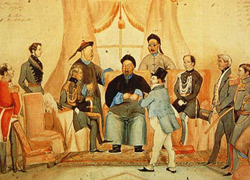To understand anything about the contemporary Chinese perspective on international law, one must have a cursory understanding of China’s history of international relations. In this regard, Chinese history can be divided into three distinct periods: 1842 to 1949, 1949 to 1978, and 1978 to the present.

The first period begins on August 29, 1842 with the coerced signing of the Treaty of Nanjing and ends on October 1, 1949 with the creation of the People’s Republic of China. Professor Wang described this period as “the unequal treaty regime” because it was characterized by China signing treaties with imperial powers while under duress; treaties which were highly detrimental to China’s own interests.
The most egregious example from this period came in the form of the infamous Twenty-one Demands made by Japan upon China. In 1915, the Qing Dynasty had just been overthrown in the Xinhai Revolution, leaving China in a politically vulnerable state of transition. At the same time, Japan had recently emerged as an imperialist power after its victories in the First Sino-Japanese War and the Russo-Japanese War. With an eye towards “gobbling up the whole of China, ” Japan occupied the Chinese province of Shangdong and presented the Twenty-one Demands to the President of the New Republic of China, along with an ultimatum that the Chinese president accede to the demands or Japan would retaliate with the use of force. Accordingly, President Yuan Shikai signed this treaty of “national betrayal and humiliation ” which, inter alia: recognized Japan’s predominant position in Shangdong, Manchuria, and Inner Mongolia, provided for the joint Japanese-Chinese operation of China’s iron and steel industries, and mandated control by Japan of China’s political, financial, and police administrations through the imposition of Japanese officials within Chinese administrative structures.
The Twenty-one Demands are representative of many of the treaties China signed during the unequal treaty regime in that they were between China and an imperialist power, signed under duress, accompanied by a threat of force, and contained provisions that seriously impaired China’s sovereign integrity. Chen Tiqiang explains the paradigm by stating, “The whole system of international law, its principles and its rules, were considered operative essentially only in relations among Western powers, the co-called ‘civilized’ or ‘Christian’ countries, while China was not a ‘civilized’ country.”
The second pertinent period began on October 1, 1949 with the founding of the PRC and ended in 1978 when China began its process of “opening up.” During this period, China was actively precluded from participation in the development of international law. Western powers simply did not regard the People’s Republic of China as a legitimate state, such that it could be a part of the international community. As a result, the most populous country in the world was not admitted to the United Nations until October 25, 1971.
During this second period, China developed its own identity relative to the world and began the process of institutionalizing international law in society. Because of its unique situation, China established what could be described as a dual identity during the Cold War period. On the one hand, China found an obvious ally in the Eastern Bloc due to a shared political and economic ideology. On the other hand, China identified with developing countries due to their shared history and troubles. With this identity in mind, China began inviting legal scholars to China to develop a system of diplomacy in accordance with international legal principles. China sought to conduct its international affairs using the principles of equality, mutual benefit, and mutual respect for territorial integrity and sovereignty.
Only during the final period, starting in 1978 when China opened up economically and continuing to the present, did it become a full member of the international community. Since then, it has become party to over 300 multilateral conventions and is now active in the creation of international law in all fields. In 2009, the Chinese Society of International Law conducted a study which found that over 600 universities offer courses in international law, 64 universities offer masters programs, and 16 universities offer doctoral programs. The importance placed on international law in the modern Chinese educational system shows that China takes the development of international law seriously and sees itself as an important player in the process.
In short, China has gone from being a victim of international law to an outside observer of international law and is now an active participant in international law. Contrasting this history with that of the Western powers, who have been active and equal participants in the development of international law since its inception, makes it easy to understand why a pronounced difference in perspectives persists. While an appreciation for Chinese history is essential in understanding China’s position on all areas of international law, it is particularly relevant to the nation’s position on the concept of sovereignty. The next installment of this series will focus on the importance China places on state sovereignty.


